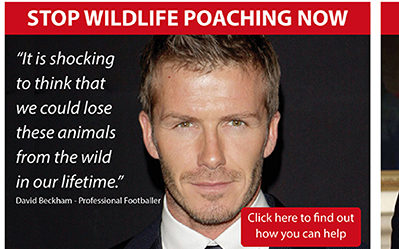Effectiveness of Celebrities in Conservation Marketing
By: Elizabeth Duthie
Effective conservation is increasingly being acknowledged to be dependent on influencing human attitudes and behaviour. Due to their fame, celebrities are frequently used in conservation marketing as a tool to raise awareness, generate funding and effect behavioural change. For example, Leonardo DiCaprio’s acceptance speech at the 2016 Academy Awards focused on climate change, resulting in a substantially higher volume of news articles, social media posts and information searches, than was generated at either the 2015 Conference of the Parties, or Earth Day. The importance of evaluating effectiveness is widely recognised in both marketing and conservation but, to date, little research into the effectiveness of celebrity endorsement as a tool for conservation marketing has been published.
The effect of celebrity endorsements on generating and retaining attention for a brand can have both positive and negligible effects. This highlights the need for such celebrity endorsements in conservation to be managed, so that issues or campaigns aren’t ‘over-exposed’, which can lead to a dilution in their effectiveness, and audience apathy. In addition, a celebrity’s own fame can dilute or challenge the core message of the association or partnership.
Using a combination of semi-structured interviews, and an online choice survey, this study investigated the extent to which a sample of UK-based conservation organisations, and other charities, evaluate their own usage of celebrity endorsement, and then carried out an experimental evaluation of a hypothetical marketing campaign.
This experiment compared participants’ willingness-to-engage (WTE) with, and recall of, a conservation message presented in versions of an advert featuring one of three prominent UK celebrities (David Beckham, Chris Packham or HRH Prince William) or a non-celebrity control treatment (featuring Crawford Allan, a director of TRAFFIC USA). We found that the organisations we interviewed did not routinely evaluate their marketing campaigns featuring celebrities. Furthermore, our experiment provides evidence that celebrity endorsement can produce both positive and negative effects. Participants were more willing to engage when presented with an advert featuring one of the three celebrities than the non-celebrity control, and WTE varied according to the characteristics of the celebrity and the respondent. However, celebrities were less effective at generating campaign message recall than non-celebrities.
Overall, our study found that whilst celebrities can be beneficial in eliciting positive WTE behaviour, they can have a negative impact on message recall, and the choice of celebrity can play a critical role in the effectiveness of a campaign. Further work is still required to fully understand the role celebrity endorsers can play in conservation but, drawing on best practice from the field of marketing, our study introduces an approach to evaluation which could be applied more widely to improve the effectiveness of conservation marketing.
Article edited by: Jamie Samson and Nafeesa Esmail






